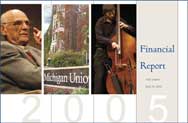

The University’s responsibility to serve the community takes many forms. Among the outreach efforts that took place last year were:
In August 2004, the MRide program began offering free rides to all U-M students, faculty, and staff on Ann Arbor Transportation Authority (AATA) buses. Since then, ridership on the fixed routes and the U-M buses has increased more than 12 percent. “MRide is working,” said Dave Miller, U-M’s director of Parking and Transportation Services. “More students and staff are riding the AATA buses.”

A U-M professor’s program to help Navy recruits cope with the emotional challenges of training improved their functioning, strengthened their performance, and reduced attrition. Reg Williams, professor of nursing and psychiatry and a recently retired Naval reservist, designed BOOTSTRAP (or “Boot Camp Survival Training for Navy Recruits–A Prescription”). “Military training is difficult under the best of circumstances,” Williams says, “[but] during a wartime scenario, it becomes even more important to have good coping skills.”
U-M and Michigan State University are teaming up with the Traverse City community to rebuild the connection between the city and its waterfront. The recent decommissioning and demolition of the Traverse City Light & Power Board’s bayside power plant has created new opportunities for the waterfront area of the city’s West Bay.
U-M and Detroit Public Schools have won the Urban Impact Award for their partnership to improve teaching and learning of science for urban children. The award is given by the Council of the Great City Colleges of Education. Organized by the School of Education’s Center for Learning Technologies in Urban Schools, the program produced steady gains and also reduced the gender gap between middle-school girls and their male counterparts.
The North Campus MLK “Do Something Day” in March did something meaningful, enjoyable, and educational for students and teachers from Detroit-area high schools. The event reached out to underrepresented students to provide information and encouragement to pursue a college education.
U-M’s Prison Creative Arts Project (PCAP) celebrated its 10th anniversary this year, bringing self-expression to Michigan prisoners. The program trains U-M students to manage workshops in juvenile and prison facilities in the areas of art, creative writing, theater, dance, music, photography, and video.
In its ten years, PCAP has helped create more than 175 original plays. The program has also supported workshops in creative writing, art, and dance.